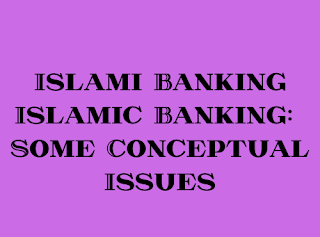Islami Banking
Islamic Banking: Some Conceptual Issues
What is Islamic Banking
Islamic banking has been defined in a number of ways. The definition of Islamic bank, as approved by the General Secretariat of the OIC, is stated in the following manner. An Islamic bank is a financial institution whose status, rules and procedures expressly state its commitment to the principle of Islamic Shariah and to the banning of the receipt and payment of interest on any of its operations (Ali & Sarkar 1995, pp.20-25). Shawki Ismail Shehta viewing the concept from the perspective of an Islamic economy and the prospective role to be played by an Islamic bank therein opines: "It is, therefore, natural and, indeed, imperative for an Islamic bank to incorporate in its functions and practices commercial investment and social activities, as an institution designed to promote the civilized mission of an Islamic economy (Ibid). Ziauddin Ahmed says, ;Islamic banking is essentially a normative concept and could be defined as conduct of banking in consonance with the ethos of the value system of Islam" (Ibid).
It appears from the above definitions that Islamic banking is a system of financial intermediation that avoids receipt and payment of interest in its transactions and conducts its operations in a way that it helps achieve the objectives of an Islamic economy.
Alternatively, this is a banking system whose operation is based on Islamic principles of transactions of which profit and loss sharing (PLS) is a major feature, ensuring justice and equity in the economy. That is why Islamic banks are often known as PLS-banks.
RIBA and its basic features
The word used by the Quran concerning ' interest' is Riba. The literal meanings of Riba are money increase, an increase of anything or increment of anything from its original amount (Maududi 1979, p.84). However, all increases are not considered as Riba in Islam. Money may increase in business activities as well. This increase is not at all considered as Riba.
The increase, instead of being prohibited (Haram), is approved (Halal) in Islam. Islam prohibits only those increases that are charged on the loan with a prefixed rate.
Muslim scholars equate interest with Riba. In the Shariah, Riba technically refers to the premium that must be paid by the borrower to the lender along with the principal amount as a condition for the loan or for an extension in its maturity (Chapra 1985, p.64). In other words, Riba is the predetermined return on the use of money. In the past there has been dispute about whether Riba refers to interest or usury, but there is now consensus among Muslim scholars that the term covers all forms of interest and not only "excessive" interest (Khan 1985, p.52).
In the era of Ignorance (Jahiliah) moneylenders in Arabia charged a prefixed extra amount on their money lent out. Some of them lent goods or crops and took back prefixed extra amount on and above the principal amount. In those days the extra amount charged on the principal amount of money or goods was also termed as Riba. The term Riba in the Quran has been used in the same sense.
Imam al Rajhi describes, "During the era of Jahiliah people invested their money and charged Riba on a monthly basis, though the invested amount remained unchanged. Money so invested was called back at the time of repayment. In case of the borrower being unable to pay back, the lender extended the period of repayment enhancing the amount to be paidon and above the principal amount." Abu Bakr al Jasas writes, " During the period of Ignorance the lender and borrower came to an agreement that the borrower would pay back
within a specified period the principal amount along with the agreed-upon excess." Ibne
Hajar Askalani says, Excess goods or money charged on and above principal amount is Riba.
Thus, any prefixed extra amount charged on a specific amount of money or goods lent out is called Riba.
The most important characteristic of Riba is that it is the positive and definite result of money when changed. In other words, when money begets money, without being exchanged for goods or services, it is called Riba. Its basic characteristics are:
It must be related to loan;
A prefixed amount of money to be paid when due;
A time is fixed for the repayment; and
All these elements for repayment are taken as conditions for loan.
RIBA and Profit
There are persons who try to equate Riba with profit. In effect, they are fundamentally different from each other as can be seen from the following:
Riba Profit
1. When money is charged, its imposed positive and defined result is Riba
1. When money is used in trading (for e.g.) its uncertain result is profit.
2. By definition, Riba is the premium paid by the borrower to the lender along with the principal amount as a condition for the loan.
2. By definition, profit is the difference between the value of production and the cost of production.
3. Riba is prefixed, and hence there is no uncertainty on the part of either the givers or the takers of loans.
3. Profit is post-determined, and hence its amount is not known until the activity is done.
4. Riba can not be negative, it can at best be very low or zero.
4. Profit can be positive, zero or even negative.
5. From Islamic Shariah point of view, it is Haram.
5. From Islamic Shariah point of view, it is Halal.


0 Comments
Post a Comment